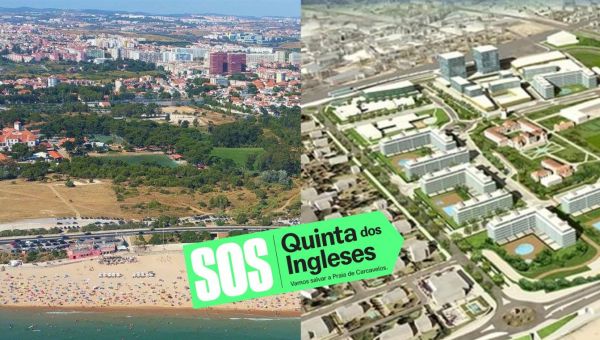Quinta dos Ingleses is next to the sea, close to the capital of Portugal. Currently, and according to information sent to The Portugal News, the estate is “the last green stronghold of the Estoril coast” and helps to preserve historical events of Carcavelos. It was here that the first telegraphic submarine cables “grounded in Portugal” were launched, in the 19th century, and also it was “one of the first places where football was played in Portugal.”
Since the 1960’s there has been a plan for the urbanisation, however, the population has always stood up and called out against new constructions. Now, there is a project that aims to construct 850 apartments, three hotels and commercial areas. If the municipality starts constructing the urban area, Carcavelos will lose a pine forest and its biodiversity, as well as a “buffer zone that protects the inland from rising sea levels.” The air quality will also be affected as the trees in the village are responsible for the absorption of CO2 in the air, affecting the population’s health conditions.
Because of all the negative consequences, SOS Quinta dos Ingleses is fighting against the construction.
The movement involves hundreds of people that are against construction in the green area. The people involved have been talking to the press as well as taking actions such as a “human chain on 5 June 2021.”
The Portuguese Government has already recommended that the movement tries to classify the area “as a local protected landscape.” The Government also added that “European Funds were available to compensate the owners and promoters.” Nevertheless, the president of Cascais says it is the responsibility of the Government, even though the Portuguese law states the opposite.
Destroying the green area to replace it with an urban area will make the council of Cascais a more polluted city, as it already was rated one of the most polluted councils in Portugal, according to the movement. The pollution in Cascais has already shown its consequences with “the withdrawal of blue flags from its beaches” with the movement adding that the construction would also increase car circulation, thus raising the levels of CO2 in the air, which would not be absorbed by trees.
Deeply in love with music and with a guilty pleasure in criminal cases, Bruno G. Santos decided to study Journalism and Communication, hoping to combine both passions into writing. The journalist is also a passionate traveller who likes to write about other cultures and discover the various hidden gems from Portugal and the world. Press card: 8463.


















I would like to point out that it's not about a village. Either it's a bad translator or the person doesn't know what he's talking about. Not clarifying at all.
By Sylvia T. from Lisbon on 03 Mar 2022, 13:49